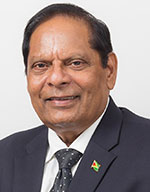CLEARING the dark shadows of doubt that opposition detractors had hauled over payment of severance benefits, the Coalition Government on Friday received parliamentary clearance for one billion nine hundred and thirty million dollars ($1,930,000,000) to meet part payment to redundant sugar workers, as promised, by month-end.
While some 4,763 sugar workers formerly employed at the Skeldon, Rose Hall, Enmore/LBI and Wales estates would benefit, all workers who would receive below $500,000 would be fully paid off. The Minister of Agriculture has placed this number at 1,600, or about one-third of those who have been severed and have become available for alternative engagements.
UNION-GOVERNMENT ENGAGEMENT
The possibility that a 100% payout could be made to some of the affected workers was raised by President Granger and myself during a meeting Friday morning with representatives of the Guyana Agricultural and General Workers Union (GAWU) and the National Association of Agricultural, Commercial and Industrial Employees (NAACIE). Heading the delegation was Mr. Komal Chand, one of the most outstanding Guyanese labour leaders who, after the meeting, was quoted as saying that the engagement with government was positive and constructive.
In apparent total ignorance of the outcome from that union-government encounter, the Opposition Leader Bharrat Jagdeo hastily offered workers free legal service to fight in the courts for their severance pay. In making that offer, the opposition leader who just recently returned to Guyana (styled elsewhere as his “adopted” country), was in vain contemplation of being a knight in shining armour on a rescue mission in the sugar belt. But his disappointment that severance would be paid without his perceived legal battle was obvious by the time he stepped into the National Assembly.
STORM IN TEA CUP
He then tried to brew a storm in a tea cup, by mumbling incoherently that the President had over-stated subsidies to the sugar industry in a message that I had read in the House. One would have thought that the guy who has been at the helm when the sugar industry was handed a begging bowl for its survival, would have chosen to stay quiet on the issue of the painful, cash bailouts.
Those bailouts had become his shame, as the industry not only ate up all its own revenues, but has gobbled up since 2011, subsidies of $48 billion, of which $32 billion was doled out over the 30-month of the coalition government – about $1 billion a month. What he did was to add the two sums, and concluded that the President had said that the total subsidy was $80 billion! There could be no doubt that he knew exactly what the President had meant, as he himself had argued not long ago that “$32 billion over a three-year period is affordable” and that “sugar needed transitional help”.
SIDETRACKING ATTENTION
But the opposition PPP was doing everything to sidetrack attention from the government’s request for just under $2 billion as an advance on severance payment, which opposition elements had implied would not be done. It was clear that the PPP was further resorting to filibuster, having failed earlier to stall measures to reform the sugar industry.
It wanted all efforts to restructure, divest or diversify to be put on hold pending a review of the report of the Commission of Inquiry into the Sugar Industry by the parliamentary Economic Services Committee, which the PPP had chaired. Had that been allowed, the entire sugar industry could have collapsed, and all 16,000 workers would have been placed on the breadline.
Then, it tried a new trick when the Finance Minister sought to amend the Supplementary Bill to increase the severance pay amount to give all ex-workers who are entitled to less than $500,000, their full benefits. The opposition raised “procedural objections” which led onlookers to doubt the sincerity of the PPP on whether it wanted the workers to get their package.
GRIEVANCE AND MISERY
I had noted that the PPP’s ploys were to frustrate severance payment and to cash in politically on the grievance and misery of workers who have lost their regular jobs. In this regard I am pleased by a statement issued by the Working People’s Alliance (WPA) that said: ““We believe that the incumbent Government of Guyana cannot be accused of neglecting sugar, and we urge the public to support the measures to make the industry viable and competitive. Our long-term view sees GuySuCo as a diversified, publicly traded entity, financed and managed by Guyanese…”
For its part, the PPP has clung to a posture that is opposed to privatisation of the sugar industry, in whole or partially. For many years I myself had embraced this ideology with a passion. The PPP argued that nationalisation had bred parasitic, state capitalism, but whilst the analysis appears to have some merit, the case for continued state ownership of failed industries, as distinct from social services, was flawed. No ideological dogma could justify the growing pauperisation of workers. This is for me an irresistible appeal for new thinking.
In the case of the sugar industry, the entire Guyanese working people became worse off when $48 billion had to be withdrawn from them over seven years to subsidise the sugar industry. That amount could have made a difference in the lives of nurses and teachers, and others on public salaries, as well as pensioners. Besides, the state of bankruptcy of the sugar industry resulted in non-disbursement to the National Insurance Scheme of the contributions extracted from sugar workers.
SUDDEN SOMERSAULT
Having seen the downward slide in the sugar industry, caused by a combination of external market situation and internal political authoritarianism, I had pleaded for us to light a candle for sugar workers. Today, rather late in the day when darkness has stepped in, the PPP has seen the light, finally.
Having suffered the loss of his grip on sugar workers at the polls, the opposition leader on October 30, 2015, declared that the PPP would fight privatisation of the sugar industry. That posture had not changed until Friday last when he learned that the sugar unions were prepared to work with government to find solutions for problems in the sugar belt.
The announcement of the severance package and the good news from the talks, had taken from the PPP’s sails the political wind that could help make the sugar belt a battleground against GuySuCo and the government. Not surprising therefore, the opposition leader made a sudden somersault.
He jumped on the bandwagon of change, and declared on what must appear to be another Holy Friday, that the PPP supports privatisation of sugar estates. This could be a new beginning for broad cooperation that could push transformation in the sugar industry.




.jpg)









